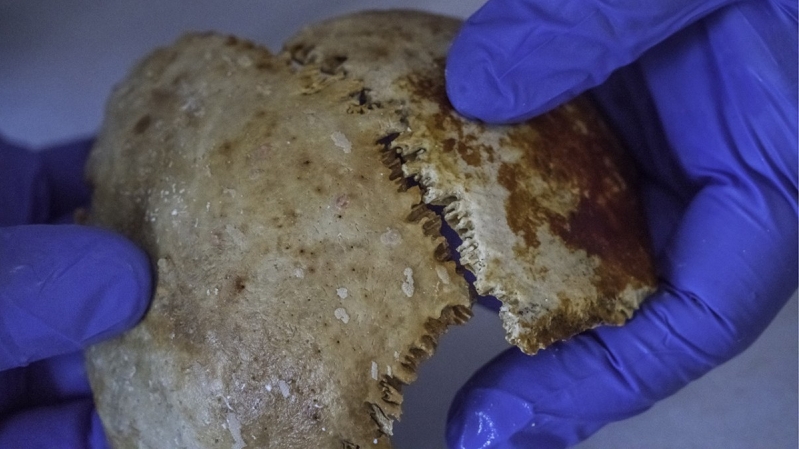
Archaeologists have been scouring the 2,100-year-old Antikythera shipwreck site in Greece for more than 100 years, and only a few human remains have shown up. Now, lucky scientists just discovered a skeleton at the site, which represents the first human skeleton recovered from a very old shipwreck since the advent of ancient DNA studies. "We can investigate this individual in a way that was never possible before," said Brendan Foley, an underwater archaeologist and research associate at Woods Hole Oceanographic Institute, who first saw the skeleton.
The bones were found 150 feet beneath the surface of the Mediterranean. Discovered by sponge divers in 1901, the wreck has yielded many, ancient artifacts, such as bronze statues, silver coins, ceramic jars, marble sculptures and decadent gold jewelry, reports The Washington Post.
Most precious of all the findings is the mysterious Antikythera mechanism, a complex, clockwork instrument that modeled the passage of time and the movements of celestial bodies; it has been called the world's oldest computer. Scientists still have no idea who made it, or why.
"Now we're face to face with someone who sailed that ship, face to face with someone who might have handled the mechanism," Foley said. "We can look through his eyes at the voyage, at the wreck, at the whole first century B.C."
Foley spent several years surveying the wreck, trying to reconstruct how it would have looked 2,100 years ago in hopes of finding new treasures. In 2012, he and his colleagues identified a second, smaller wreck. They found lead sheets from the hull of the main ship that were sourced from mines in northern Greece, and deduced from the preservation of the human remains that they must have been buried by organic material right after they sank. Those facts, paired with a cup uncovered by an earlier expedition that bore the Greek name "Pamphilos," helped Foley to begin imagining details of the ship's demise.
He said it is possible the Antikythera was a grain-carrying ship.
Such ships frequently carried tourists, such as the Greek man Pamphilos, who must have been both wealthy and literate to have a cup with his name and know how to read it, reports The Washington Post. Laden with cargo and passengers, the ship could have been sailing toward Rome when it passed through the narrow, reef- and rock-chocked passageway between the islands Antikythera and Crete, just south of Greece.
"They were sailing along, it was probably that proverbial dark and stormy night, and they didn't know how close they were to Antikythera, and before they knew it they just ran into the cliff," Foley said. "And they were lost in an instant."
Foley and his colleagues believe the skeleton just uncovered probably was caught between decks as the ship went down. A preliminary analysis of the remains, which include two femurs, the long bones of the forearm and most of the skull, suggests they belonged to a young man, probably in his mid- to late 20s.
After the skeleton was found, Foley contacted Hannes Schroeder of the Natural History Museum of Denmark, one of the few places in the world with the technology to sequence highly degraded ancient DNA.
Scientists have never successfully sequenced human material that had been submerged in so much saltwater for so long; though remains were uncovered from 16th- and 17th-century shipwrecks. "It's tricky, because this is such a rare find that we don't have a lot of experience in the field generally," Schroeder said.
Per Schroeder's advice, Foley and his colleagues removed the bones from the sea floor one-by-one. Each was photographed and 3-D-modeled, then placed in a plastic bag with sea water to keep them as close as possible to the conditions under which they survived for 2,100 years.
Now the scientists are awaiting approval from Greek government officials to start testing the remains.
"It's a little bit of a race against time," Schroeder said. "Those remains were preserved down there at 50 meters below sea level. If you started changing their environment, they will start degrading quickly."







